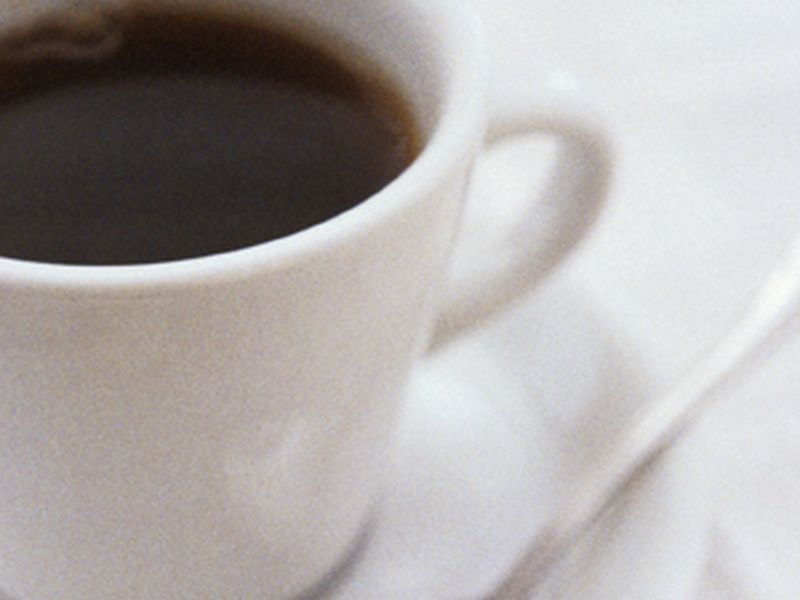Crave Coffee Too Much? Talk Therapy May Help
Caffeine intake dropped more than 75 percent after just one hour-long session, study found
HealthDay Reporter

MONDAY, Dec. 1, 2015 (HealthDay News) -- A short round of "talk-therapy" seems to help over-consumers of caffeine dramatically cut back their intake, a small new study suggests.
Caffeine-use disorder, though not yet an official mental health diagnosis, is defined by caffeine dependency and an inability to consume less caffeine despite a desire to do so, the researchers explained.
The new study found that just a single one-hour session of "reduction-strategy" therapy -- a type of cognitive behavioral therapy -- helped patients lower their caffeine intake by more than 75 percent. The goal of this type of talk therapy is to help patients understand, recognize and change irrational thoughts that are causing their behavior.
"What we're talking about here are people who have not only a physical dependence on caffeine, but also negative physical and psychological repercussions if they try to cut back or quit, and therefore an inability to do so," said study author Laura Juliano, a professor of psychology at American University in Washington, D.C.
"And we found that therapy helped people with this disorder make significant reductions in consumption," she said.
The study was published online recently in the Journal of Consulting and Clinical Psychology.
Juliano said caffeine is the most popular psychoactive drug in the world. It's consumed by roughly 90 percent of Americans -- including children -- in the form of coffee, tea, chocolate, or energy drinks and bars.
Though caffeine tolerance varies, and there is no hard-and-fast rule, Juliano advised limiting caffeine consumption to about 400 milligrams (mg) per day, roughly equal to two or three 8-ounce cups of coffee.
But prior research, she said, indicated that although the average American consumes about 200 mg per day, many people consume far more. And, more than half of regular caffeine consumers have trouble reducing or kicking their caffeine habit, Juliano said.
That struggle can persist even when caffeine dependency causes anxiety, tension, stress, sleep problems and jitteriness, or threatens to complicate other health concerns, such as an impending pregnancy, heart disease or a bleeding condition, she said.
In 2013, "caffeine-use disorder" was recognized by the Diagnostic and Statistical Manual of Mental Disorders (DSM-5) -- an official list of recognized mental disorders -- as a concern worthy of further investigation. But the DSM-5 stopped short of declaring it an actual diagnosis, the study authors said. (Juliano served as DSM-5 advisor.)
With that in mind, the current study set out to explore the potential caffeine-kicking benefits of behavioral therapy.
Cognitive behavioral therapy is already known to be very helpful for depression, anxiety and an assortment of addiction issues, said psychiatry professor Janice Kiecolt-Glaser, of Ohio State University said. Kiecolt-Glaser wasn't involved in the current research, but reviewed the study's findings.
"In general, the goal is to help change maladaptive thoughts and behaviors by learning to pay attention to them, and developing alternative strategies for handling challenges," she said.
"But if someone with an addictive disorder is ordered into treatment or doesn't really consider themselves to have a problem in the first place, this kind of treatment is generally not that successful or far less successful," Kiecolt-Glaser added.
"It's really most effective when the patient knows they have a problem and is motivated to seek therapy in order to overcome their issue," she said.
That's exactly the kind of men and women Juliano and her team enlisted for their study. All 67 participants indicated having tried and failed to cut back on caffeine despite a strong desire to do so.
On average, participants consumed just shy of 700 mg per day, the study found. About seven in 10 hoped to cut down that figure, rather than give up caffeine altogether, Juliano said.
Half were randomly assigned to immediately receive one hour of therapy with a trained counselor. They were also given take-home material that outlined a plan for a slow decline in caffeine spread over a five-week period. The other half also received therapy, but only after a six-week waiting period, the study authors said.
The result: the behavioral therapy enabled more than three-quarters of the participants to reduce their caffeine intake to less than 200 mg per day. And they were able to keep it around that level even one year later, the study authors said.
"It's impressive," said Kiecolt-Glaser. "I'm not aware of other treatments for caffeine addiction. But this appears to be an excellent way to go about it. It makes a lot of sense."
More information
There's more on caffeine at U.S. National Library of Medicine.
SOURCES: SOURCES: Laura Juliano, Ph.D., professor of psychology, American University, Washington D.C.; Janice Kiecolt-Glaser, Ph.D., professor of psychiatry, The Ohio State University, Columbus, Ohio; Oct. 26, 2015, Journal of Consulting and Clinical Psychology, online
Last Updated: Tuesday, December 1, 2015 12:34:47 PM EST
Copyright © 2015 HealthDay. All rights reserved.